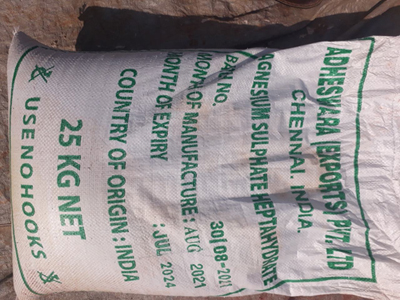Booming black market sends fertiliser prices sky high

One of the illegal fertiliser bags on sale.
Sri Lanka’s experiments with the truth on organic farming and a severe shortage of fertilisers has led farmers down the road to the booming black market network selling chemical fertilisers and pesticides at exorbitant prices.
Chemical fertilisers and pesticides have been in short supply since a ban was imposed on May 6 and even though authorities backtracked on this ban on November 30, Sri Lanka is now saddled with a lack of money to buy even its essentials leave alone fertiliser.
A leading retail store selling fertiliser and agrochemical products in Kilinochchi says that due to the acute shortage there has been an increasing demand and they are forced to sell whatever is available in the market.
“There have been allegations of adulterated fertilisers consisting of harmful minerals and outdated stocks,” the store keeper said on condition of anonymity. “We don’t know about these things and we sell what our distribution agents supplies to us.”
Prices of fertiliser saw a sudden increase from Rs.12,000 to Rs.28,000 in recent weeks as a result of its short supply in the market weeks before the Maha season comes to an end. “Still many farmers are left without fertiliser,” he said.
A bag of urea (35kg) in the black market is selling at around Rs.28,000 and Rs.32,000 that some of the small scale farmers are unable to pay for, one farmer in the north explained. It is learnt that in the black market there are different types of fertilisers that are currently selling. Some fertilisers are part of an old stock that are allegedly being repacked and mixed with other minerals.
“We are worried if we will have paddy for our own consumption,” the farmer said adding that even the fertiliser provided by the state has not worked out well and they will be unable to obtain an adequate yield to sell in the market.
“Bottu urea”
Other illegal fertilisers are smuggled in boats called “bottu urea” mainly from India. It is learnt that these are likely to be entering the country from places like Kalpitiya, Jaffna and any other outposts along the coast, shipped on Indian “wallam” or the traditional big boats to the borders of the Sri Lankan waters. From this point multi day fishing vessels hand over stocks enough to fill about five smaller boats.
It is then handed over at the shores from where it is then transported inland by lorries. Farmers receive radio messages through secret signals when new stocks arrive.
Widespread network
Farmer activists like former MP Namal Karunaratne point out that in places like Siyambalanduwa in Moneragala they learnt that illegal fertilisers cost Rs.25,000 – 30,000.
He said they have learnt that these illegal fertilisers are today rampantly available in Nuwara Eliya, Welimada and Bandarawela and as a result the vegetable farmer is mainly impacted as there is no government regulation or guarantee.
Meanwhile, tea smallholders who were earlier given fertiliser at Rs.1500 are now forced to spend Rs.6350 that can only be bought together with a bag of compost priced at Rs.1000, Galle Kalutara Smallholder Estate Owners Association founder Secretary Ushan Samarasinghe said. Smallholders are compelled to turn to the illegally imported fertilisers sold in the black market at prices ranging between Rs.10,000 and Rs.12,000 for a bag of urea from certain tea factories, shops and middlemen purchasing leaf.
Riding against the tide
Authorities like the Kilinochchi Agrarian Department are doing their best to advise farmers as they tried to create awareness among farmer communities last week against the use of these fertilisers.
Officials explained that farmers are duped into buying these fertilisers as they are sold at night; so the colour of the urea and this illegal fertiliser can look similar.
The Registrar of Pesticides on September 28 had issued a notice stating that there were a number of illegally smuggled pesticides sold in different parts of Sri Lanka that is packed either locally or in another country and marketed with the aim of duping the farmer and making profits.
Northern Regional Agricultural Research and Development Centre Additional Director Dr. S.J. Arasakesari told the Business Times that according to the photographs the chemical is magnesium sulphate that makes the element Chlorophyll which is about just 2 kg and is sufficient for an acre. “But if you apply more it could be toxic and the physical structure of the soil can deteriorate and chemically it can be acidic and it may be toxic to the plants too.”
The Agriculture Department in its crop forecast states by the end of November, 543,753 H of paddy was sown, 7 per cent lower than last year during the same period.
The cultivation target has almost been realised in Jaffna, Kilinochchi, Batticaloa and Mahaweli System L. The sown extent reported from Colombo, Gampaha, Kalutara, Vavuniya, Mullaitve, Ampara IP, Kegalle, Kurunegala and Mahaweli System Rambakanoya have exceeded the 75 per cent target. About 7,199 H in total have been affected due to floods, pest and diseases and other reasons.
Other field crops have achieved 58 per cent of the target covering an extent of 105,735 H. But of the vegetable cultivation targets only 37 per cent of the up-country and 44 per cent of low-country crops have been achieved.
Hitad.lk has you covered with quality used or brand new cars for sale that are budget friendly yet reliable! Now is the time to sell your old ride for something more attractive to today's modern automotive market demands. Browse through our selection of affordable options now on Hitad.lk before deciding on what will work best for you!


